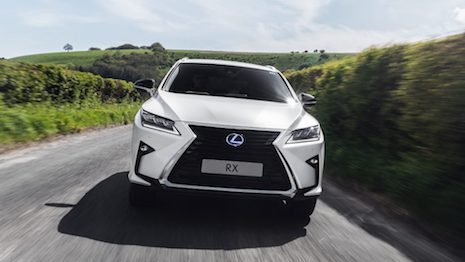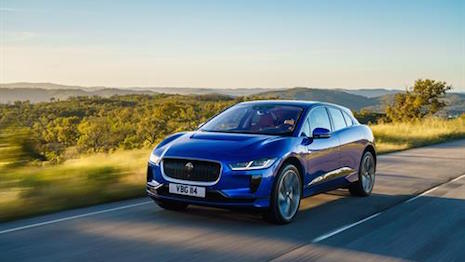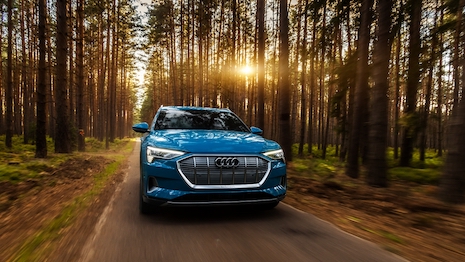As regulations across the world strengthen and consumer demand changes, luxury automakers have the difficult task of building SUVs with little emissions while maintaining exclusivity.
Outside of the United States, emissions regulations are becoming increasingly stricter as the world looks for an answer to the global climate crisis. These new parameters are forcing luxury automakers to get creative with their designs to keep the power and exclusivity that they are known for, at the same time as the SUV becomes ubiquitous, according to panelists on Luxury Daily’s automotive webinar on June 12.
“What is coming out of the tailpipe is being heavily regulated,” said David Undercoffler, editor in chief of Autolist. “Before this, luxury cars were as powerful as they wanted to be and what was coming out of the tailpipe was not relevant or anything that anyone was concerned about.
“But no, these regulations are something everyone needs to be paying attention to,” he said. “It is forcing the luxury players to really be creative.”
Changing demands and regulations
While many automakers in the luxury and supercar space have maintained that they will never design an SUV, consumers are demanding this type of model.
During the panel, Tyson Jominy, vice president of data and analytics consulting at J.D. Power, explained that the efficiency and utility of SUVs are so much greater than their sedan counterparts that it is no wonder why consumers are flocking to them.
But as urbanization in the United States grows, automakers are looking to create unique designs that will help SUVs fit the city lifestyle, said Cliff Adams, group-planning director at Team One, Lexus' agency of record.
 Image credit: Lexus
Image credit: Lexus
So much of a luxury marque's status lies within exclusivity and remaining differentiated from the masses, which makes the growth of SUVs an interesting challenge for high-end automakers.
Mr. Jominy explained that there is potential in body style and design. Losing some utility to focus more on luxury design will help these automakers cater to a more exclusive group.
Average consumers who need an excessive amount of space will not be the customers for this particular segment of vehicles.
In addition to the rise of SUVs, automakers are also facing more regulation on emissions. Regions such as China and Europe are holding automakers to high standards on what comes out of the exhaust pipe.
However, in the U.S. under the Trump administration, regulations are being pulled back, causing a rift in global demand. Automakers are now actually pleading with the White House to maintain previous regulations to keep standards continuous, said Mr. Adams.
There has also been a shift in who is commanding the auto market.
Mr. Undercoffler explained that in the past, the U.S. would be the most prominent driver of how auto brands operated, but now that power is shifting to China.
This will likely mean automakers will continue to focus on sustainability.
To introduce a more sustainable operation into SUV design, automakers are looking into factors such as electrification, aluminum builds and other lighter materials.
Electrification does not necessarily mean full battery powered vehicles but refers to a variety of electric-powered processes in terms of driving.
For luxury and supercar makers, electrification is allowing them to experiment with unique high-powered drive trains that offer unparalleled performance.
 Jaguar's I-Pace. Image credit: Jaguar
Jaguar's I-Pace. Image credit: Jaguar
However, the battery-powered engines still lack the famous roaring sound of the motor that many supercar fans have come to love. This could lead to a future where extremely pricey limited-edition models that are not street legal will feature gas-powered drive trains.
Even Ferrari, which is famously known for its V12 engines, has introduced new engine formats that will combine a twin turbo V8 engine with battery-powered sources to replace the harmful fumes from the V12 build.
Automakers are so committed to a healthy future and innovation in EVs that many are partnering together.
BMW Group and Jaguar Land Rover have even joined forces in an effort to tackle important issues such as electrification to create a more sustainable environment.
The two luxury automakers have signed an agreement centered on the development of electric drive units to support a transition to a future focused on the Automated, Connected, Electric and Shared Vehicles movement. With both automakers seeing significant advancement in the EV market, the two are partnering in an effort to streamline further innovation in this area for a better future for the Earth (see story).
Autonomy and the shared economy
Another subject that continues to pop up in the auto industry is the notion of autonomy.
But the panelists agreed that full autonomy will not be commonplace until about a decade from now. Until then, extremely high-priced versions of autonomy could become somewhat available, but on a very exclusive basis.
The idea of ownership has also evolved. Consumers are becoming less interested in owning their own vehicles and are looking into temporary rentals or ride sharing.
German automaker Porsche’s U.S. importer tapped into the sharing economy with the launch of a subscription model of ownership for its vehicles.
Porsche Passport, available in select areas, allows enrolled consumers to rent up to 22 different models through a mobile application, allowing them to cater their car choice to their needs. As traditional car ownership becomes less of the norm, automakers are adapting their purchasing models to reflect consumer behavior (see story).
Mr. Undercoffler cited Porsche’s subscription model as one of the standout services, as it allows members to switch between different vehicles types. This means they can opt for a more practical car during the week or for a family trip and switch to a more power-driven sedan on the weekends.
While currently luxury automakers are the most common to have introduced a subscription model in limited areas, in the future J.D. Power’s Mr. Jominy explained that private ownership will likely be the ultimate luxury.
“One other threat [to automakers] is the whole idea of ownership,” Mr. Jominy said. “Some think that the ownership model is soon to be dead, but I don’t see that in luxury.
“In terms of luxury, to be able to own your own vehicle to get where you want, when you want is the ultimate luxury,” he said.
Click here to view a recording of the webinar
{"ct":"6g5RWmWtzyrnFLRWl5YQBIQVERPeOv+8otrHN4A1O8AMNqmMmudTGzsxeSqllN1domq\/PibXTxlE2QRwkYiswTYz1RtMr5K9V00vCas6zxitmfiq8U12oG7WEqC\/MiZ6zWlgqxuWbr51uqyG3yB6AFjQJQ3OOkKkcR0S3fpaWrOJIgLc2YOVqEb5XBasrhkVhtA4lFXkTB5tcev0P0VDkoWFLFHj5pt2w\/qH2TVpKPt8t1LnmCZvzV8klL3wqfkmmlmDaVv9\/tmv\/eSEOowSL4uWVrnWBihg3gNDEeKN8ogj\/Z6k\/aW9WxWuiIOvvOwYsu\/La8gh5J8wvx5LatEAD7wUOt1cYjk3hCwewanHSoQ617sAKJkZG62T7xXAPP7o5E\/7KxDz2TCntmS\/A5L9rKo+5a6XCkr+CFRK953pNTAkJc1U+ZsktH5mSFXlKWPus+bHDaKuWCAZZo8GK9PX22leujBjol\/wU3QJNx\/bHb2u7KOwNVtngFdUicsvi5OnSL\/Yp+D9aWYPcwI+XTHtXJGzo\/6tjbhg4eitVsZcZHN0WJUMQJ9qM\/TJSHe4USnTsAfeM6q0C5rjru4uu+DJldyAL5T4LLWWCmp2Mx\/vlDn\/75fI7QyehNK3CeETltakYEPCP4fPSeFESVfQK66cUgoSkN2dp+GVZWMvRMZEPATuD7XGeRG\/o3TcPZv3R7egk3AIElVW4YghP9lFndll8E8AYtm4QQfSrIblBRfbuG6CA6him1km8YHwOG8HfsibUu\/\/p24ibKrex9wRhV+cOUUCBML30MK8REZnf3JqwKhFH4ivsr\/60fe19Hk+x02mrl7WKvrPNuEJPouVMPynLoXldBztaZEI7inBnmU+auRHeQkWcKxQ\/2F3n2E3s7FxHVHJDFbuElXF3W3cFD0dD7kgKaIZq60Tjz5YUn73zcljVAuKaW1drGqG3THLy9L7rCSh0+adXUg4u1+LfG9kACKabu6T0DkTahUs9LphuQE9Z1KfAL\/WggWVErcog\/not+C2H0caaPFJh2v4PAIgtdto4V3jxiOaK5VvLgnFXdI25Jl1n\/XsbY2cTMwWO\/DCP1Hkpe5MjdtKgDoUS0etYkxMhH\/1A0IAnMNL9ruWz+OoWH3M8IpwF8VDIFWA90mzbIkr0Q08V4IiSiry9WU9dVI+Bzj\/DFfkx2IiCWOpxPJJiNiz34SS5Y1ZCgVzO05JsvFIQ0inZtIdMj8SuFSxmgB0K\/VPv5\/vizx91954zgF7WPxhsd8UjMMUSasNi\/CVAwJMwIme6PkftbkY\/UC6qDQjK9oAzjs7TC4RjDuYqkfzDR5yOk9FvFewS1iEx0mUXK1gyxk6MRRN94eKcK\/bJCyUnKguZVZ1POcX8uNDuBUeohUPFV5nmblixNwDwZGn3EJHAoUcfdvHblkjCEyfhfPuLPJCrfBKuohlJ1w0XfdLWD5Lqlx5ZMBWLQVIvEU92Z+pQ9E8EGJ8l2gW3aqXHkt\/fkO\/7NNYNHbpD2HlGxBDQz8mduL9l6XfDS0sWjifwf991LMllGC4INuvKCnN5bO3jbDjm8EW6fKNpAE76krkME82Ijh7cvThnhxNwRuOLElmVhqLCW7dnu7P+GNpaJYv+dl\/wCufNT4A8jZyo0M\/mx3U2g5bpjVH3YulSNWlE9MX4IHaGkQU8LbpOykyde+Sbj\/LcISa4gI9HtXlEGwuygRkRUQV31DJ0UQOzNddAlval4MwNjd32ltV1uIv\/xG8BmsT2cfMil0ORAkJXKDpivpbYFTDLR\/Yap9MJCsCbhR4QZeQWUrdqisYTvOdbLzHyJunQSPCqw2cZk5z5EnAWi5lCdD7lERgkC\/vEwCVIuye85DGcnKArqkTvzmmfu3ZYDnOX7FzvzET+mPb7kIQ0DhY68XzR5CAS4QNiGD\/MImSasoPUBY4Qq1alkcu\/P8c5V6DfstLSn4TjWHlalNKAGjyMKpxt2ZIl8x+Ny192EF7pSYHQUSGij0jacWYDcM1\/WtgLrftzwJj6\/27kKpRJ4DBNQSPsoybB+QpOOjbORiDwian4nVV9\/maMFyhZXyam0C8Sswqpvd0s0HNlyeIHGFgs6lVwZ\/yz\/\/tMJGtu5wpl7cojv5gR576DgO6b5AfBV+\/\/cIm0o7DkTmCARMwysPClnQQsOXgGtwrvnaIJaJtBmY6WM4+QWgOe3m7pg01aKAQ5MkzUdFjiowtsYVV2BLGnrSTd1\/fxCV\/xD1dfSJTcTB4DviwjqC5vzZmLmxEnQUc37PFGIcy8YoSJ7emBidn0QV1ejLCP2yW+wxCPsyUeEBWeHafRnoRAOZ8ZWt4K3Xku3eH\/jFgRi3aCxFr24\/wG8fGZWWfSevVwGqblrBTDCgSxaSQvds7X9RSia2kWg7pmbI2he6J5zuZajPb6wUghQT62EIz9SDlX+oZV7tVBXSzMkpY8IT72D0l7mKJ0OcXAf95pHGqOoKJpcfucgWRb6w9aqEdEEx6X3lWC\/R1c0RJiUTxM9MdOApKVbvK\/jCSyUqTETm8g+zhZyV6FYEVo61vErzTNLzKyXkpTbUJEa9PtDt\/JnOn1wGcB\/9VJj6HwbC53ulozdrwBuBST2BMq4+82gbM0yqUQf1Y1rUPc7Ed4KYxxb754vPGbVTcbfGnNi1yeY5TFuUzKY3swirNQy18kVcHELM08uO163YVZ\/YnN4W1t6ReRqcZX9l2d\/C6UzRHbd9ggKZADMCOPnFoGhjo8h+ZzfndAPlM2MSANqZVOpOjJwAiNGKEXoVNadLystmQG4lZuY+8rZI+g9T0BOPwhB6U3ko7gUk1w\/bt3LP8iX8I35XmjrAWRlMI3mBaIkEMAxW0mgaE74smWRpo2DCHp88etuQ3q+f9AkukPZ2VMlVjAxp7PJiXmAVhid9XYLo\/TvhY2j+D9yz35\/PeJG1sjPQnecrpebs2KAGNJOpVtHtT+jQHy\/qACN6OEkGLTZIFirlS\/2keaoZAaiCCZfqD\/sXg8P1nOk7zGGl46jL+sLT8gD64BByyUcPMH8IE0hLDGegb9Txkzl6I50\/mTnl5rg9Qrj\/fWCi+VixO5EDY7NaWePJADf7MhL+A5wYDL903hojQFHEe404Hsqsj7x9D8cNpn9zDzJDv9BTbEbG9hUevo1QjsYMEIAd4mtqioCodkOgPRSDsPG5ASCpAPPoH8t23VGmjpTIOmBzb9O0j3c44DQJPxutA\/h8TM4Lmc3NaOyheuczL8+3U783na6ACxjt4mp5rT8JsrRy3D90Eybq4TOCD\/PBv1w5rCx1HGj2ykOQMn1KxwmIhzlje8OLIE3Z+KTLY6lCMjLKyt3Tjnj4yyXeUfDQ2rRXHsfju0Mq72G92wnwhzVURcEzetDsJfSjG3uLuFtN1toqYV066R38UCseT5rXfSs8P5aeLV3eZfpxBoz\/e566zwJZ10yEUNm+RzI+FQx6eBx6eHW3YJBgx6KTFi19PmfVSpfv8vICa4jimK1nGbgQArBJP3zlZ1Npni3ckCc63Qu5QMHzHkxeF4PthuDJWuFSzmbzwiOL94Tfz5AGIgI3mG4hNpOaovT6oyGksRBZo7kHA2SK236nZyR6ltZjkgRpIamaFSDtShZv1q7bwZAh2\/+jSqqPyo4cdSiI7SfnFFGFRvpssOMcHtb9J1W4ffM5i7IYq1GRad6m\/uNiZn3DCJx9ujwzUrOGXYkoVVsDp8K8c\/IFNoI09USx59GT4WkK0wmm1GD9\/g5N9iuQckiC+n+wpDkUpFH9VZQPfDSBCXksXZuPEYQppRuINrLOHuqFaX7NU68m3aEyLXgZ4wECXbT+KR0vdta8VhzmGKjCeQkXcoLbdj6Jj8njxJ9zju+coqWRDNibVyQ2c5T0kYQl8GWAAliRJaHqYBkmpgRUch5myAQ\/BZFb6yWGO1PHdp99dY8XJVbnJ\/S2xtVYXQwr58VC2hYXKF4pDH+uiP6Qi0k3SekoFjbIzUDiIZtXuUUl3E+7v8xwKoKEN7rsCW47FgtBTfNiBnwhjc2cMuP7yT1kkl+GyLZSXjwcOKsuRXkrvF5amQdoHkfYmpsXplQWWVVtkqHZ05403QkHNwLGO15lQ6Fr+9MXYsmYqKQ8lgGy\/xgxWDb7bO\/wPLw69yz3bN25vvGI4m2nwJh40SYD51Zl0OBE49FhlqqrNYkd8urmH5sqYEDI2YS0kgpnOvDOebO225wh6fAragm3\/q+GF9KNE8l+AfWYMaKMVr7n3JysAoMYBDvLw5VDvWmcbayJpldktCPXpQ16AmB22M2Pyabdei6QrC\/nbONY2WWsZq6OmcQU31m4q0F\/nVL7s8kjOSWk8XxMG+A8nsEq1wLS\/PW6EydIWX0M1uVd6ohgBI\/8HDWJYT5E7Z03i0NfGuhkrIxsPJQdmy0rwCyE65a5La7JAG9NsQ95+IA1Nhi0feVNEU8LkI4TdINlhKTlrvXb+1WYQD2VIWDnH2MSKQmPscQ4Fg9K1duiQJNEfTPzSZmdASbJr46uAeQQwoJ7+na4nokC+blBLKukKl+B\/DgsgWcoWRUjW2pQ++Ibt52u6ZqkPsK+8zFuPDc37kMh0SL0iEFRETE\/O6pao4UNydrc5ghQE4RW4J4t\/g8Tkpc\/M8Z+gwZFt8FpaQfXX2JgrwqxAseaMsd8BkbKKNawE\/buGjLAo+y0lmZ68ffo5flmh9uiMD+\/ZT6KBLE0VNNGx9opTaqLBrV2EdEn6VStGNdTf7OiCCeUT6mKY6BvqiGefA1+la34dZ85tJe1EZRJ8wZ6FjRKNXspIAuQjGBPl9PyvcjbTHPbEXk3IH2TiOnsYzF2E5tiw1vXAP1LO0Qbk8ngEvWzPI91mKdnpMDdxSOoYFk2yB+nrZtKF+qUNsBOFnZuA1vRAfCnWga\/MnPniPQS1B4XWGxYSbSXB3MpvCEFuMXkyOmSGloUEL7awdjFeVPsxYlpNZxIhU0sDhyEEyLvQ0FFu5lPUMMqIoCZymLlZjUqcPUsAbOMru1yGreGbxQymWjIgavf38RYOHp4cPwUJ8DM5lFaejkW3r4vuokNQrIvE9vptbW\/r166giqEUp+awbNeTr5Uv28293YFnpA+I0V9okURhYwYs0N2hkoWZmHSzNbtLxMJGm7+d8SsGT7XZi8n8mZYbSH0TMuFCn7fkWwe4jCRVOimA8Rhq6AM4Uv2dTPr13MeSyLT59Tp8QzhsFea8f94dwbBwd3kDuLyajia02HTLSGqNc40YoB7mwrQdH2LEZ6H26QSmPqQUPSuaWo\/8nHz9jPdjYqbxy+bq7xCGE4\/OKegj+j5ie+xQZOxLfAoh4Hd\/3wGtWFQXVZiXK4Iu+SGija3xh\/S3fV3eMt4TPhl9f\/KhBdXokal5ohv25MlhZyLmfKo6YZKuuULtxK\/WkMsnBqb4JO5hXJa2a\/A36XeDtTM\/wj94efqAvEuu7Br7MxSePy1Hl4d8hIJ92\/tQDDGfopsmWJvIRn\/XchwA71i5R2bPT4xHBkKd8wyVW8kjtqTA5fj2bJgA3TJQY12m7JYQvsSsfIjJo\/VeMSPve5NS5tgbCLLsCyrn+pZgXO\/QlwmpN4HoUSBsamXbuzbFagqxLe+uyGQH0IJCzxOwWkhWWWRajcABDEWRZkU4IKBwcrixfEybsbZQyAcvIlx36tIuuI\/qop0ua\/GyVdG09\/ns3VEFZoWkhRvtYqNbfkefv\/dZdigfDDAttP26ts79kmj5Vy7Yf7Yhfj3Zl\/5\/npSHgni8AbMkHVqJgPLc1kqyPlMmJSrnPxBnmQBwPgFoV0EqhBvhli95hLCTmKMU5UNsSr8iLu+xyXtXNJwxy5uxqYhd+XHX09DtrnkUCzIQtMTF68+TUzcniGD3HwI1\/JjlFODWqdJ2fks8jinkEnOxFPnyeAaCvP02lPHFObJwwsTr23HJE0GsokHpzc+qjcLhPIf1b+D46a3g6ZOpEiqTfDC8kzZOlu5azsPLVkSCL1hwzq+8oN4iGy5u1ZvBfrBDUk5iTgTVNOKODfhesQmXB2TMqhmkG0jA9HghwC\/G976NS5q2NLarAygxMqE9p1y+SRAvxZ3rD8VthR1P+0RQ0JWPesWK\/WZtqtZVbIi9ioMkjvf3WPmEhBXtmYt3IPVuBflP7nq6cXPSVXu9dfOMbMK5LDJ\/CTFkVi6E4XnUJlaYBgsMXvfmsOAycHaejim7gWiKbXXyyweFiLHN7b3wA3mIGkM+rMDiumfR5c6JrAGNHy32QTpPsYY0iTLkNZ3kmvqjofKkbl38Z2FtNcWw8PaoQyrKDA8lQ\/M9YpeMxZTuH2uMW6adSOMSKI51u0izeWQozSm1KK\/AoRfqvVDQJMkF\/xjISiA6GtXVmENyC2M4iTCmTy7Gh7zXb1D2VpPzt7YwzmEMdQbuwynVQXoLt2lCz3H\/ETuIfyZ4YUNc9NLBYVVNusmRpOS2zaS\/XAx92SMc0RXCpQT9hTeaH33BAF1eQfvui9k1D4uVOFdXcPUy4Szbaoao1jOqcKQAajcYxD\/Rkzqo5M+u49eJmrA3Sd4MVKckCxYJeD089wEI\/fGbh4AkdntxcOJzJ5Zg5eoG\/vTUvGaRcBJfvcnnEShQmsZHgk8YR4rR2kcHjkAwVuhFlnclG2CwoRbUtWNn2UgxiMbM6XyJeF8d4KyHWBS42RBCOy+JO7TobLZ9Pwzz9GQLf8CsJhKPQsA9bfbhcYEeP8yzIkzB8EjPbkqmAgpyIZd342lG1rzaDQPzHb6Akei4tdtDJ\/tWxLzlVea1KRqN\/2ae2f6aNQVftvdXBB1NcBbXTlK6EzgS2sUvtI3Prt+E1aZcGgzBegB3sJf+xEkPm90Up0tNLZEBr5pCY5egjoUpstkor2MRyQ0QonLIfwMev1\/bWV\/TT2g6UBNQGM78gqQvFcHKg+wUHY6qnGEq8vKtSyyuoaa+bJ5zu2SSxgr0cGWHVe4ky2Nr4y2lT\/AYEEl4u\/Fc7n6q4aSn+jq\/gKKJvdDUHniAbl6ag8Wt822BiBzQhuyiyYUYnR08eywCrJzH482tog+FxAF3q8abtPNRhfJWc+NNaQ6LlfIhfxzv\/MCprE00i7h7NgmHx8NtT2lgMou\/LpFKdb3qOXdqFL7WDnM7ouZdM8EMRGZuIRHWssNO1G8Rr7uaHOH82ObAl1a+6IPZZDdE4TIzcZ4B0R+r8DNff9itgM9AEU9ZoFxzTLjOu6tEm6XkaQs\/9KsfSEVGssuEG2JsShCj17jxiplEDjZmLd\/\/Db+QccatbLaMi17MKE6SL4\/6EMzUclNnY6ivlgWeUiZdjm8w0hZKmMxoaJhROUdtr5Ap6wcf2WYyG\/ZxlIcC8p7E03py\/pdnBvjH8hgxIroaZQLpMXB6bcJvSxG7AsM\/KgqJVVb44f5X6PjfvDtwfgZaGawStaqax1Maf\/0Uup44mcZgl5M1kd\/3Echvg4zf1+Y6N13SNx4Ps9hMRFhbWUvNHRicVGsR5lBPqMIsk\/uTRnl4rqS1ZiJUHLRbOIYHAar8nBtgRpo\/LEgFi6fTJ6NV4rfwjxbQaBBIdY8VHUz\/\/FwWYOr0QhnX1ydEGrqDsNtSK6+\/mbxs77eN+i8gYZs\/gu9RgUjXdMyqlG5H5syAU\/4LMK+\/imaWcMRRAfWD9qbbmcmJmylEvX\/ah6avRqHl72BjZFRkdZn07db95LdPOXLQDqfojD7bDoJB5USSFgBubtq7nGNUnIPCbFgPwEcqxBJnwUBhV8WXCpQq2408vyDThm\/DsLSJuC27zvimso0fJvEmXtyW7z2EiMzc5Bqr6\/FIAZcYs6gB6Ydk8Yollna3k2JXaax+YdZu11tV9tnzBpDoMe94CN\/wRlA\/mq695ecXmdmXgmeBU3zT6Reo4ZNn2NrixsB7L\/e3WYhQZaYR8LYJIEHjdLdJT5218wEmZc9siQgqpueTpIJSrC6dAbq2VDLlEhbcuZnqA3IV6UWy\/32dJoTkfOU31uECQ9\/WMiVpFGML2h+QJ5ltrrRQkKVPwxZ1dbphyZW13tU89+fGeeU4FYc\/e3obDu8GB7mCDh3Ypsgff4U4R75iFai5fDYduBzJpH54nwq+fxeWS2KmhD6YSF5tSy16uFwdDL3hhInzGKY4jd\/ZuBDIjZhwRgQLpuk0NStt1YCsRb51ddlzH3JvJney9udKpKtXiZArp2wh\/SE0SBijXz0S0L8MYSNLEqdSS4zHHSoek\/aSL+pICjrc64pSbITGY1i5V6N4+0KzwmsKqQ3H1k2tXlpDnOtCjLsMvvCMRhCMLEx1sX0lEnzHFJzMEQ0xbcsybRRvIAstvg48D9iWJIENhw5uwpDUIKM4VFpBhvsHJJqh6cFOk55BVzqZjoUk0hh+y6XBB9V6tdIqAMhkEphGBCc62p0kk4+akhOW+4aFytJFfiCifNsjU1QXP8YdOdT87gCDYSKWNSkSv9\/S7yT\/dP5e3HRnWtrY0hBWVzvFAebg40qvOc4UP72RgPFuYUIi656oISj6RuHzNcITohoHiu\/9loCKF5uojTYWcQ6cXH2KKY7iumo\/iy1tHM\/7eq5KPhyQlJWw2liyvEDXHneUfK+n74VVw0RZsA8f5w\/KjBJWEBKmlHA+m5D7Qt6i3O3ofKnAHTfVklBE7XeyUMKgT8JMFlvGRbOjf\/IDeLIldPEgdS9PBhTwm5Rwsc+8MXxNJofChQfJv3klkQJYl7wo6QqK9r00LQLgF2i1DL8bug3Yrt7nLEjX5uwqDsUO6yOf5GrhBTNOM\/8E86zY4sWohpQI4v56drYoVyPT4Qpb+Pp8lseahRYicdSOG4FiuFBqZvNwcWWvSVqUDpCIwCVdWwLgOPHXxUc8zw\/cqEcceZMQhZMS6pTPdNgoN5\/fp4X3TbBFCtSjNRfNLus\/MJg0Xo1Pmmcw4Mi2tn+L\/q+ak87VCFu4XhKT7rbh2rHjVeIHNrv6S59KuT9Q6RFx5355fKlxcdMXlCfVnlU8pihWQ0hVRsARofdnW5StpPDvpztkYbBA0pFI0JcMY99w1NMXaTSw+RQidTRmPedSU3Z3+K6iAHUTtdvcPP7CJrbKvpy5gfZip6XrkyxICNwhkVDCAazarY1JzglDhgC1DQrb2j9Sv61Gjlf5ympoCVHc1EPuJCJerg\/47uY2X3LvfDzy982rM2g4bGxkyQjrwPTmFgFDRlG06gwo5dV4N3mwcArhBC8YliUmHpAFm6ppcFZheuOXNBc0+vvaUvC8qVFVlrMML3i0aBp7AE+lBHRUhfpqFhstatfslMMbfbNtQMvWGGsKlTg6PMPqBMMKFYfWrKhVxqnG2+KgO7V\/eS27S84+8mX4lxE1U1TJzSAGdHRq0aJKdIcW+V327iIQ3CPc5qLKPB2R09a1ZzsLQen3eW0Ti+eM6H\/C8tyQD0SAgeejJgvUDUShcW3Pksils0F595iOtj+gOVNTJh1LwkIxE3x8uUyIu4C\/2lAjEw9+Ur9PagwjsvcrgvyMbJfrPHeImBZkJM8K4Xm7ycyfSYgzCOnivu5aQPXhxSE7RTwCrXpUkZTXYPYUHLWlx21LxkeikxRWZeu2d1rPz6r5SiiDhH4sNYF1HEp7Gje8fKPpPe3G7uaGsCbDFV43W1VALTmCi3M66o7hQxZBXTmTkd5Y7ZL2IrATxOXUarX1bXf36dyoBkJXygyIAd7qPuF5Wj\/RLprvNUD0w9rRy1EPynZtSJmKpkYmec8tGy\/eM5JXVdBLgBD1NQp9RlsIy5CdjvpgzRYaI3idEvgHjAkmyAe\/saPA1DnwHei+shLNjVozuUfhV\/xqaEa1AlnPjWo6amJVruDBFm2NhK6uJj0TyrGCyFQC\/zkUdcZ7BSRCW3LXs+zI9ix6Gbejvxa46KeiL0mrphh6pgZ9WhbxkjGMHVGFZMDV7ASOk7P\/BqdKUHpG+PRPHTtOEROgnCqA1WhTil71FzsNo9UtIKtl2uA175b0mcVWBM8kMWp5mRa4WenUTarPrDuM4CrntSGN2qsvMo+8SrLb7AUN4V1NV50x11sBl\/ufdfyW4rOjA7m5McXZhtJmCMi8zGEfOfsC7tGpsanngc4\/a1G4p4hvM70nBAzxYqUnYw3WQR2fLxKiyqwbwq7RK4scDjaruJeMPvsOmq7ZP2oGc4vWC7LDoi++vPL7e3bb9rjyWGs68l8eV4oTmkE1e0ZIt6KVRVq+8JruR4jWQksWJxefKph+c4iPcGG4LwEN13D3u5dZE6OKcyWJz1rH4Y2pWUKOw6sTnW5b+ci3uG5QMmhsSnSGfrAhzodF7jYbwiOY+UvI3V+juaWwhfRfuioD\/hnQeeZaJ3TZWRzQwpc6t+oR5KZrYOZL6aWmm4k\/yKGHCKNMA8mZEFswPtaWSgF6ptbufCylGwUMxBkR+FtnP\/vpjZBaS2UFSDymZqTDUYDgSuXn0nZs5Mzt6ynipgHMLZcb8837y84M+9NcRkaP8PV5MIaR33ngA3VlKY85AnRUMxY4tn2d2KeF6+jtTXwjiggTxUrTHBWqcUqu2zmRhIC\/6eW27JzqFAzwMUPPH82w9hbnrG5CiUq5QVyk3KVO3C5uxFtylo7F2w1S1Uemnru95dXjHslDlXIRljuVIDQhhh+TgS0oKg5Vtu998gGP8\/oqEnJCsXHMygTLzYvbQyzO+svRfTF1Ez1XzGAtMSg2T2FJ8noz2dv87Rh8RjY4hzYnhmEMLghrkjyvgb7AfJjXsGxWZwrWfqdTwfTfjj00gidoEe\/tlzvBDxwZA2vRnXtBhDNnkjz4yZ17Cc7\/ibpOoFjfAhd2Hf54z\/XG78XLcy9AfYDsQdMSraIcJawkcc5v4JZIrtjPzcdHQq2a1wfXKGflkcQlK6J3iStKD19oA473BGIOaNHcN9h8l7UuWPYK2jLrRhlTXJTGvu\/St6PADXGs+EyHhTFiIRdF1h6b+LaU5G5Le3R8j2gP9dr7+OBmMP+oQZLeV5RTd0YLQ+CqfWlddBH4PpPsYVwjvHy0VQUDo78Wm6F45GlvcLtyHM1fMYLILgWA9EykzXpNfNP1wX142dwNjJ3Q5A8oFmZQ5ruUzZ1OvErwfc6aI8faSHtSffaYEKpSs+NdkldLlERI3nKP2a0PFsh1cNs9hOFiG\/1irv41H8OSs7quglP5W4le\/e1Y03BO8hWGtcYB8UIYAz88kDpwJCa8+xmIRNfSLj9m3msDKbtcN0\/PDuVM7fe4ZDs2lqgDMdPnKyOrfA==","iv":"091133eb55f689caa6af2697a5399527","s":"9cc80de169604040"}

 The e-tron is an all-electric SUV. Image credit: Audi
The e-tron is an all-electric SUV. Image credit: Audi  Jaguar's I-Pace. Image credit: Jaguar
Jaguar's I-Pace. Image credit: Jaguar